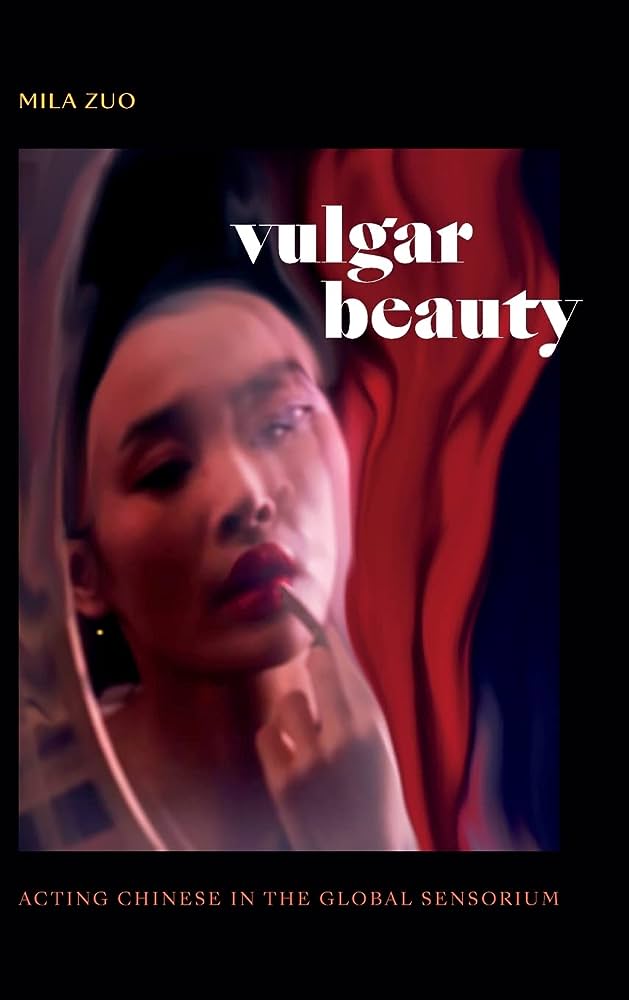
In Vulgar Beauty Mila Zuo offers a new theorization of cinematic feminine beauty by showing how mediated encounaters with Chinese film and popular culture stars produce feelings of Chineseness. To illustrate this, Zuo uses the vulgar as an analytic to trace how racial, gendered, and cultural identity is imagined and produced through affect. She frames the vulgar as a characteristic that is experienced through the Chinese concept of weidao, or flavor, in which bitter, salty, pungent, sweet, and sour performances of beauty produce non-Western forms of sexualized and racialized femininity. Analyzing contemporary film and media ranging from actress Gong Li’s post-Mao movies of the late 1980s and 1990s to Joan Chen’s performance in Twin Peaks to Ali Wong’s stand-up comedy specials, Zuo shows how vulgar beauty disrupts Western and colonial notions of beauty. Vulgar beauty, then, becomes the taste of difference. By demonstrating how Chinese feminine beauty becomes a cinematic invention invested in forms of affective racialization, Zuo makes a critical reconsideration of aesthetic theory.
Vulgar Beauty is the 2024 book winner in media, performance, and visual studies from the Association for Asian American Studies.
““In this gorgeously written book, Mila Zuo captures how Chinese female film stars perform beauty in ways that reflect their negotiation with the racial sexualization of their femininity. With a rigorous and lucid ferocity, Zuo boldly brings together critical theory, philosophy, aesthetics, women of color feminism, feminist film theory, and performance theory to help us understand Chinese women’s presences on screen. Fearless and powerful, Vulgar Beauty is a pleasure to read.” — Celine Parreñas Shimizu
"[Zuo's] metaphoric language, mostly revolving around food, offers the reader not only an intellectual exploration of the power of vulgar beauty to destabilize racial and patriarchal power structures but also a flavorful and aesthetic journey in and of itself." — E. Nastacia Schmoll
“With thorough, eye-opening, and groundbreaking analyses, Mila Zuo brilliantly scrutinizes the meaning of East and Southeast Asian beauty, showing how it is a process that has been historically framed within complex colonial and postcolonial discourses that individual stars and films must conform, resist, or play with. Offering scholars and students a new method with which to rethink East Asian and Southeast Asian stardom, film texts, and popular cultures, Vulgar Beauty will make a splash.” — Victor Fan
“Zuo’s writing performs another example of the author’s theory of beauty; one virtuosic in description, breadth of reference, and telescopic perspectives, but most of all in the imaginative sutures of one thing to the next, as to theorise the haptics and alimentary rhetoric of mahjong in Lust, Caution (Ang Lee, 2007). Whatever beauty is, there is plenty of it in Vulgar Beauty. Anyone interested in performance, in gender and sexuality, in race on an international stage, in Chinese politics and history in this century of suffering, needs to read this book. Anyone hungry, voracious perhaps, for interdisciplinary diasporic and transnational critique that engages not only with cultural but also intellectual traditions from China and Korea had better prepare to feast.” — Vivian L. Huang
“Mila Zuo’s Vulgar Beauty; Acting Chinese in the Global Sensorium is an exciting intervention in Cinema and Media Studies....by opening questions of beauty and cultural specificity up and also providing an example of reaching outside the Western cultural and conceptual tradition to develop new ways of answering those questions, Vulgar Beauty marks an important and highly provocative breakthrough.” — Chris Berry
"Offering a new analytic of Asian American media performance, Zuo’s theorization of vulgar beauty specifically offers a provocative, fresh way to theorize gender, race in the global which we believe will have contributions to Asian American Studies, Asian studies, diaspora studies and beyond.
“This evocative work enacts the idea of vulgarity and excess in a theoretically-rich and groundbreaking study. Fun, pleasurable, and potentially field changing for thinking through gender and race through diaspora. Mila’s writing style offers both a theorization and ‘how to’--she teaches us how to understand things that we don’t commonly put together. Poetically written and theoretically synesthetic, this book embodies its high-stakes theory by incorporating the five tastes/flavors with a global purview that challenges the boundaries of Asia and North America, addressing its audience’s doubled gazes, refracting circuits of desire and despair." - Association for Asian Studies 2024 jury
